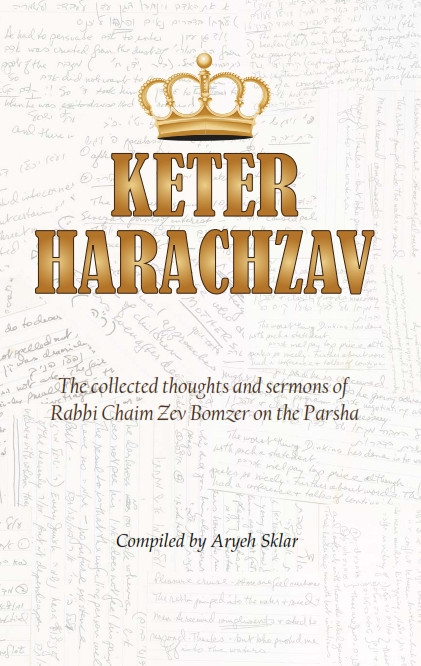Rabbi Herbert Bomzer’s Torah teachings
In a newly released sequel to the Torah teachings of Rabbi Herbert Bomzer, zt”l, a volume titled “Keter Harachzav,” by his grandson, Aryeh Sklar, we learn of Rabbi Bomzer’s special relationship to the late Lubavitcher Rebbe, zt”l.
Rabbi Moshe Kotlarsky, a leader of Merkos L’inyanei Chinuch, writes in Sklar’s volume:
“I bore witness to a remarkable relationship that grew between Rabbi Bomzer and the Rebbe. He was inspired by the Rebbe’s vast scholarship in all areas of Torah and by the Rebbe’s love for the Jewish people, particularly for those trapped behind the Iron Curtain. In addition to lending his halachic expertise where needed, Rabbi Bomzer journeyed on a clandestine mission to the former Soviet Union where he was guided by the Rebbe. In the spiritual wastelands of the Soviet Union, Rabbi Bomzer strengthened Jewish education and undertook many daring initiatives spanning the gamut of Jewish life behind the Iron Curtain.
“As a representative of the Rabbinical Council of America, Rabbi Bomzer catered to the halachic needs of Soviet Jewry in the areas of kashrus, mikva’os, kidushin and gittin; as a representative of the Student Struggle for Soviet Jewry, he met with Refusniks struggling under the fist of the Soviet empire; as a representative of Ezras Achim Lubavitch, guided by the Rebbe and his agents for Jewish continuity in the Soviet Union, he was granted access to and provided guidance, resources and vital assistance to the vast network of underground yeshivos, chadarim, and the bustling underground Jewish life behind the Iron Curtain.
“I vividly recall the Rebbe’s response to Rabbi Bomzer upon his return. The Rebbe wrote that amongst all the clandestine missions to the former Soviet Union, Rabbi Bomzer’s journey was the most successful and fruitful. Indeed, his warmth and wisdom left a profound impact on the despairing Soviet Jews; the seeds that Rabbi Bomzer planted then continue to blossom to this very day.”
This awesome recollection resonates with me given my own personal involvement in the cause for the ultimate liberation of our Jewish brothers and sisters from the wretched rule of Communism and International Socialism in Europe. But with the help extended at great personal risk by people such as Rabbi Herbert Bomzer, our efforts would have surely come to naught.
This coming Shabbat we read the Torah portion of Ha’azinu, traditionally read before the festival of Sukkot. In Rabbi Bomzer’s essay on this parsha, this year the exact day of the 21st yahrtzeit of my dear father, Max Gerber, the rabbi devotes his attention to the reading of the Yizkor prayer that was said on Yom Kippur, and will be recited again next Monday on the festival of Shemini Atzeret. It is to this prayer ritual that I wish to devote the balance of this week’s essay.
I present following teaching by Rabbi Bomzer in sacred memory of my dear father, z”l.
“Why do people with parents walk out at Yizkor? Most say to avoid making them sad on Yom Tov when they see their own parents saying Yizkor and crying, it interrupts the joy of Yom Tov. Rav Moshe Feinstein, zt”l, in his introduction to his novella on Tractate Bava Kama, says: ‘Concerning the minhag to exit the shul when Yizkor is being said, there are many reasons.’
“Rav Moshe adds his own: ‘It is prohibited to say a memorial prayer if there is a bridegroom in the shul. Why? Because it is his Yom Tov and the entire congregation found there is included in that Yom Tov. How could they say a memorial prayer, which would be painful, at the moment, which calls for joy of a fellow Jew? We must celebrate with him! Even if there are thousands of people in that shul, we do not say tachanun or maleh'."
Rabbi Bomzer adds to this teaching the following observation:
“So how can we say Yizkor on a day which is a festival for all Jews? Rav Moshe explains that the pain one feels in memorializing a beloved brings oneg (joy) to that person who remembers his parents and relatives. But this ‘joy’ is only felt by the mourner who remembers. However, the person in shul who sees the pain of his fellow Jew, who must remember the dead; that brings no oneg to the observer. So he/she should go out at that time.’”
This is a hard teaching, one that has to be parsed carefully, with feeling for the mix of emotions that are at play here. Such were the complexities of life that Rabbi Bomzer addressed his career in the many years in the rabbinate to a career to which we look back to through the words of this sage, as presented so sensitively by his grandson in this precious work.
Contact Alan Jay Gerber: Columnist@TheJewishStar.com

 47.0°,
Overcast
47.0°,
Overcast 




